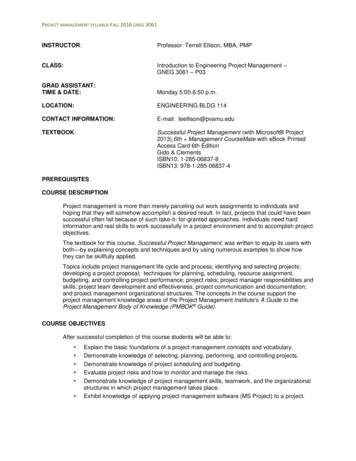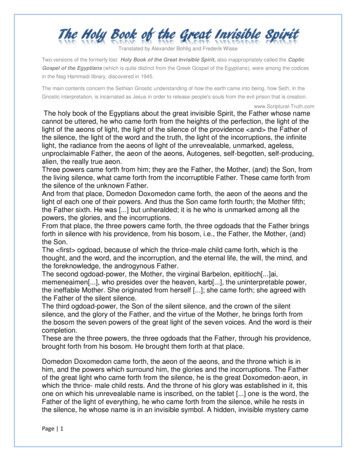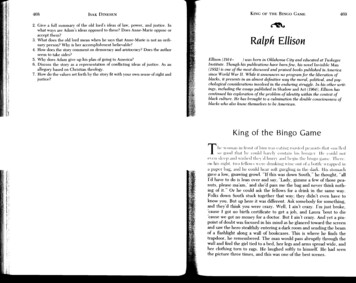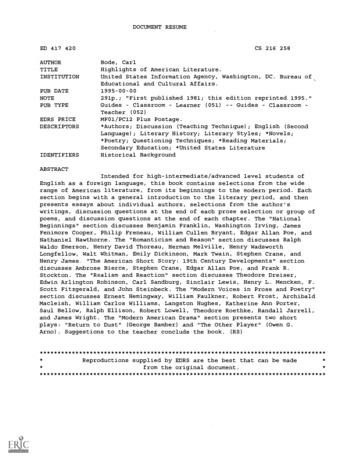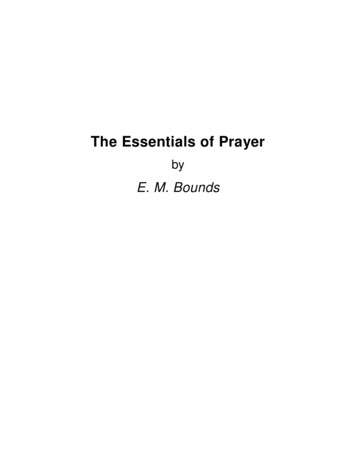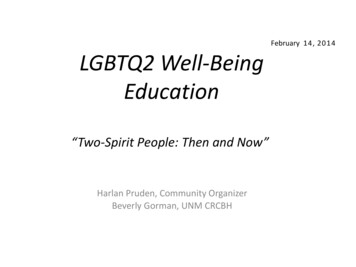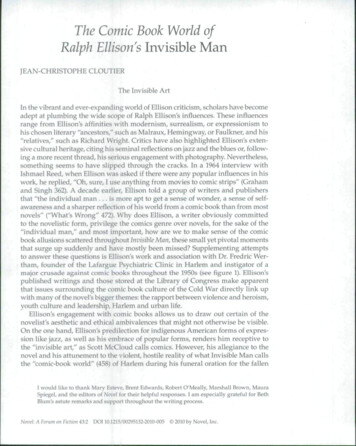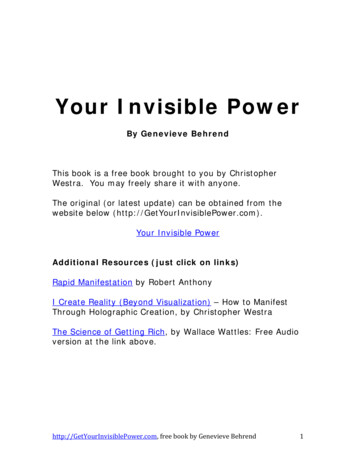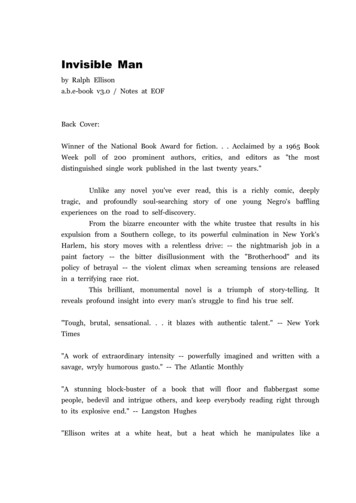
Transcription
Invisible Manby Ralph Ellisona.b.e-book v3.0 / Notes at EOFBack Cover:Winner of the National Book Award for fiction. . . Acclaimed by a 1965 BookWeek poll of 200 prominent authors, critics, and editors as "the mostdistinguished single work published in the last twenty years."Unlike any novel you've ever read, this is a richly comic, deeplytragic, and profoundly soul-searching story of one young Negro's bafflingexperiences on the road to self-discovery.From the bizarre encounter with the white trustee that results in hisexpulsion from a Southern college, to its powerful culmination in New York'sHarlem, his story moves with a relentless drive: -- the nightmarish job in apaint factory -- the bitter disillusionment with the "Brotherhood" and itspolicy of betrayal -- the violent climax when screaming tensions are releasedin a terrifying race riot.This brilliant, monumental novel is a triumph of story-telling. Itreveals profound insight into every man's struggle to find his true self."Tough, brutal, sensational. . . it blazes with authentic talent." -- New YorkTimes"A work of extraordinary intensity -- powerfully imagined and written with asavage, wryly humorous gusto." -- The Atlantic Monthly"A stunning block-buster of a book that will floor and flabbergast somepeople, bedevil and intrigue others, and keep everybody reading right throughto its explosive end." -- Langston Hughes"Ellison writes at a white heat, but a heat which he manipulates like a
veteran." -- Chicago Sun-TimesTO IDACOPYRIGHT, 1947, 1948, 1952, BY RALPH ELLISONAll rights reserved under Internationaland Pan-American Copyright Conventions.For information address Random House, Inc.,457 Madison Avenue, New York, New York 10022.This is an authorized reprint of a hardcover editionpublished by Random House, Inc.THIRTEENTH PRINTINGSIGNET BOOKS are published byThe New American Library, Inc.,1301 Avenue of the Americas, New York, New York 10019PRINTED IN THE UNITED STATES OF AMERICA"You are saved," cried Captain Delano, more and more astonished and pained;"you are saved: what has cast such a shadow upon you?"Herman Melville, Benito CerenoHARRY: I tell you, it is not me you are looking at,
Not me you are grinning at, not me your confidential looksIncriminate, but that other person, if person,You thought I was: let your necrophilyFeed upon that carcase. . .T. S. Eliot, Family ReunionPrologueI am an invisible man. No, I am not a spook like those who hauntedEdgar Allan Poe; nor am I one of your Hollywood-movie ectoplasms. I am aman of substance, of flesh and bone, fiber and liquids -- and I might even besaid to possess a mind. I am invisible, understand, simply because peoplerefuse to see me. Like the bodiless heads you see sometimes in circussideshows, it is as though I have been surrounded by mirrors of hard,distorting glass. When they approach me they see only my surroundings,themselves, or figments of their imagination -- indeed, everything andanything except me.Nor is my invisibility exactly a matter of a bio-chemical accident tomy epidermis. That invisibility to which I refer occurs because of a peculiardisposition of the eyes of those with whom I come in contact. A matter ofthe construction of their inner eyes, those eyes with which they look throughtheir physical eyes upon reality. I am not complaining, nor am I protestingeither. It is sometimes advantageous to be unseen, although it is most oftenrather wearing on the nerves. Then too, you're constantly being bumpedagainst by those of poor vision. Or again, you often doubt if you really exist.You wonder whether you aren't simply a phantom in other people's minds.Say, a figure in a nightmare which the sleeper tries with all his strength todestroy. It's when you feel like this that, out of resentment, you begin tobump people back. And, let me confess, you feel that way most of the time.You ache with the need to convince yourself that you do exist in the realworld, that you're a part of all the sound and anguish, and you strike out
with your fists, you curse and you swear to make them recognize you. And,alas, it's seldom successful.One night I accidentally bumped into a man, and perhaps because ofthe near darkness he saw me and called me an insulting name. I sprang athim, seized his coat lapels and demanded that he apologize. He was a tallblond man, and as my face came close to his he looked insolently out of hisblue eyes and cursed me, his breath hot in my face as he struggled. I pulledhis chin down sharp upon the crown of my head, butting him as I had seenthe West Indians do, and I felt his flesh tear and the blood gush out, and Iyelled, "Apologize! Apologize!" But he continued to curse and struggle, and Ibutted him again and again until he went down heavily, on his knees,profusely bleeding. I kicked him repeatedly, in a frenzy because he stilluttered insults though his lips were frothy with blood. Oh yes, I kicked him!And in my outrage I got out my knife and prepared to slit his throat, rightthere beneath the lamplight in the deserted street, holding him by the collarwith one hand, and opening the knife with my teeth -- when it occurred tome that the man had not seen me, actually; that he, as far as he knew, wasin the midst of a walking nightmare! And I stopped the blade, slicing the airas I pushed him away, letting him fall back to the street. I stared at himhard as the lights of a car stabbed through the darkness. He lay there,moaning on the asphalt; a man almost killed by a phantom. It unnerved me.I was both disgusted and ashamed. I was like a drunken man myself,wavering about on weakened legs. Then I was amused. Something in thisman's thick head had sprung out and beaten him within an inch of his life. Ibegan to laugh at this crazy discovery. Would he have awakened at the pointof death? Would Death himself have freed him for wakeful living? But Ididn't linger. I ran away into the dark, laughing so hard I feared I mightrupture myself. The next day I saw his picture in the Daily News, beneath acaption stating that he had been "mugged." Poor fool, poor blind fool, Ithought with sincere compassion, mugged by an invisible man!Most of the time (although I do not choose as I once did to denythe violence of my days by ignoring it) I am not so overtly violent. Iremember that I am invisible and walk softly so as not to awaken thesleeping ones. Sometimes it is best not to awaken them; there are few thingsin the world as dangerous as sleepwalkers. I learned in time though that it is
possible to carry on a fight against them without their realizing it. Forinstance, I have been carrying on a fight with Monopolated Light & Power forsome time now. I use their service and pay them nothing at all, and theydon't know it. Oh, they suspect that power is being drained off, but theydon't know where. All they know is that according to the master meter backthere in their power station a hell of a lot of free current is disappearingsomewhere into the jungle of Harlem. The joke, of course, is that I don't livein Harlem but in a border area. Several years ago (before I discovered theadvantage of being invisible) I went through the routine process of buyingservice and paying their outrageous rates. But no more. I gave up all that,along with my apartment, and my old way of life: That way based upon thefallacious assumption that I, like other men, was visible. Now, aware of myinvisibility, I live rent-free in a building rented strictly to whites, in a sectionof the basement that was shut off and forgotten during the nineteenthcentury, which I discovered when I was trying to escape in the night fromRas the Destroyer. But that's getting too far ahead of the story, almost to theend, although the end is in the beginning and lies far ahead.The point now is that I found a home -- or a hole in the ground, asyou will. Now don't jump to the conclusion that because I call my home a"hole" it is damp and cold like a grave; there are cold holes and warm holes.Mine is a warm hole. And remember, a bear retires to his hole for the winterand lives until spring; then he comes strolling out like the Easter chickbreaking from its shell. I say all this to assure you that it is incorrect toassume that, because I'm invisible and live in a hole, I am dead. I amneither dead nor in a state of suspended animation. Call me Jack-the-Bear,for I am in a state of hibernation.My hole is warm and full of light. Yes, full of light. I doubt if thereis a brighter spot in all New York than this hole of mine, and I do notexclude Broadway. Or the Empire State Building on a photographer's dreamnight. But that is taking advantage of you. Those two spots are among thedarkest of our whole civilization -- pardon me, our whole culture (animportant distinction, I've heard) -- which might sound like a hoax, or acontradiction, but that (by contradiction, I mean) is how the world moves:Not like an arrow, but a boomerang. (Beware of those who speak of thespiral of history; they are preparing a boomerang. Keep a steel helmet handy.)
I know; I have been boomeranged across my head so much that I now cansee the darkness of lightness. And I love light. Perhaps you'll think it strangethat an invisible man should need light, desire light, love light. But maybe itis exactly because I am invisible. Light confirms my reality, gives birth to myform. A beautiful girl once told me of a recurring nightmare in which she layin the center of a large dark room and felt her face expand until it filled thewhole room, becoming a formless mass while her eyes ran in bilious jelly upthe chimney. And so it is with me. Without light I am not only invisible, butformless as well; and to be unaware of one's form is to live a death. Imyself, after existing some twenty years, did not become alive until Idiscovered my invisibility.That is why I fight my battle with Monopolated Light & Power. Thedeeper reason, I mean: It allows me to feel my vital aliveness. I also fightthem for taking so much of my money before I learned to protect myself. Inmy hole in the basement there are exactly 1,369 lights. I've wired the entireceiling, every inch of it. And not with fluorescent bulbs, but with the older,more-expensive-to-operate kind, the filament type. An act of sabotage, youknow. I've already begun to wire the wall. A junk man I know, a man ofvision, has supplied me with wire and sockets. Nothing, storm or flood, mustget in the way of our need for light and ever more and brighter light. Thetruth is the light and light is the truth. When I finish all four walls, then I'llstart on the floor. Just how that will go, I don't know. Yet when you havelived invisible as long as I have you develop a certain ingenuity. I'll solve theproblem. And maybe I'll invent a gadget to place my coffeepot on the firewhile I lie in bed, and even invent a gadget to warm my bed -- like thefellow I saw in one of the picture magazines who made himself a gadget towarm his shoes! Though invisible, I am in the great American tradition oftinkers. That makes me kin to Ford, Edison and Franklin. Call me, since Ihave a theory and a concept, a "thinker-tinker." Yes, I'll warm my shoes; theyneed it, they're usually full of holes. I'll do that and more.Now I have one radio-phonograph; I plan to have five. There is acertain acoustical deadness in my hole, and when I have music I want to feelits vibration, not only with my ear but with my whole body. I'd like to hearfive recordings of Louis Armstrong playing and singing "What Did I Do to Beso Black and Blue" -- all at the same time. Sometimes now I listen to Louis
while I have my favorite dessert of vanilla ice cream and sloe gin. I pour thered liquid over the white mound, watching it glisten and the vapor rising asLouis bends that military instrument into a beam of lyrical sound. Perhaps Ilike Louis Armstrong because he's made poetry out of being invisible. I thinkit must be because he's unaware that he is invisible. And my own grasp ofinvisibility aids me to understand his music. Once when I asked for acigarette, some jokers gave me a reefer, which I lighted when I got home andsat listening to my phonograph. It was a strange evening. Invisibility, let meexplain, gives one a slightly different sense of time, you're never quite on thebeat. Sometimes you're ahead and sometimes behind. Instead of the swift andimperceptible flowing of time, you are aware of its nodes, those points wheretime stands still or from which it leaps ahead. And you slip into the breaksand look around. That's what you hear vaguely in Louis' music.Once I saw a prizefighter boxing a yokel. The fighter was swift andamazingly scientific. His body was one violent flow of rapid rhythmic action.He hit the yokel a hundred times while the yokel held up his arms instunned surprise. But suddenly the yokel, rolling about in the gale of boxinggloves, struck one blow and knocked science, speed and footwork as cold as awell-digger's posterior. The smart money hit the canvas. The long shot got thenod. The yokel had simply stepped inside of his opponent's sense of time. Sounder the spell of the reefer I discovered a new analytical way of listening tomusic. The unheard sounds came through, and each melodic line existed ofitself, stood out clearly from all the rest, said its piece, and waited patientlyfor the other voices to speak. That night I found myself hearing not only intime, but in space as well. I not only entered the music but descended, likeDante, into its depths. And beneath the swiftness of the hot tempo there wasa slower tempo and a cave and I entered it and looked around and heard anold woman singing a spiritual as full of Weltschmerz as flamenco, andbeneath that lay a still lower level on which I saw a beautiful girl the colorof ivory pleading in a voice like my mother's as she stood before a group ofslave owners who bid for her naked body, and below that I found a lowerlevel and a more rapid tempo and I heard someone shout:"Brothers and sisters, my text this morning is the 'Blackness ofBlackness.' "And a congregation of voices answered: "That blackness is most
black, brother, most black . . .""In the beginning . . .""At the very start," they cried.". . . there was blackness . . .""Preach it . . ."". . . and the sun . . .""The sun, Lawd . . ."". . . was bloody red . . .""Red . . .""Now black is . . ." the preacher shouted."Bloody . . .""I said black is . . .""Preach it, brother . . ."". . . an' black ain't . . ""Red, Lawd, red: He said it's red!""Amen, brother . . .""Black will git you . . .""Yes, it will . . ."". . . an' black won't . . .""Naw, it won't!""It do . . .""It do, Lawd . . ."". . . an' it don't.""Halleluiah . . ."". . . It'll put you, glory, glory, Oh my Lawd, in the WHALE'SBELLY.""Preach it, dear brother . . ."". . . an' make you tempt . . .""Good God a-mighty!""Old Aunt Nelly!""Black will make you . . .""Black . . ."". . . or black will un-make you.""Ain't it the truth, Lawd?"And at that point a voice of trombone timbre screamed at me, "Git
out of, here, you fool! Is you ready to commit treason?"And I tore myself away, hearing the old singer of spirituals moaning,"Go curse your God, boy, and die."I stopped and questioned her, asked her what was wrong."I dearly loved my master, son," she said."You should have hated him," I said."He gave me several sons," she said, "and because I loved my sons Ilearned to love their father though I hated him too.""I too have become acquainted with ambivalence," I said. "That's whyI'm here.""What's that?""Nothing, a word that doesn't explain it. Why do you moan?""I moan this way 'cause he's dead," she said."Then tell me, who is that laughing upstairs?""Them's my sons. They glad.""Yes, I can understand that too," I said."I laughs too, but I moans too. He promised to set us free but henever could bring hisself to do it. Still I loved him . . .""Loved him? You mean . . .""Oh yes, but 1 loved something else even more.""What more?""Freedom.""Freedom," I said. "Maybe freedom lies in hating.""Naw, son, it's in loving. I loved him and give him the poison andhe withered away like a frost-bit apple. Them boys woulda tore him to pieceswith they homemake knives.""A mistake was made somewhere," I said, "I'm confused." And Iwished to say other things, but the laughter upstairs became too loud andmoan-like for me and I tried to break out of it, but I couldn't. Just as I wasleaving I felt an urgent desire to ask her what freedom was and went back.She sat with her head in her hands, moaning softly; her leather-brown facewas filled with sadness."Old woman, what is this freedom you love so well?" I asked arounda corner of my mind.She looked surprised, then thoughtful, then baffled. "I done forgot,
son. It's all mixed up. First I think it's one thing, then I think it's another. Itgits my head to spinning. I guess now it ain't nothing but knowing how tosay what I got up in my head. But it's a hard job, son. Too much is donehappen to me in too short a time. Hit's like I have a fever. Ever' time Istarts to walk my head gits to swirling and I falls down. Or if it ain't that,it's the boys; they gits to laughing and wants to kill up the white folks.They's bitter, that's what they is . . .""But what about freedom?""Leave me 'lone, boy; my head aches!"I left her, feeling dizzy myself. I didn't get far.Suddenly one of the sons, a big fellow six feet tall, appeared out ofnowhere and struck me with his fist."What's the matter, man?" I cried."You made Ma cry!""But how?" I said, dodging a blow."Askin' her them questions, that's how. Git outa here and stay, andnext time you got questions like that, ask yourself!"He held me in a grip like cold stone, his fingers fastening upon mywindpipe until I thought I would suffocate before he finally allowed me to go.I stumbled about dazed, the music beating hysterically in my ears. It wasdark. My head cleared and I wandered down a dark narrow passage, thinkingI heard his footsteps hurrying behind me. I was sore, and into my being hadcome a profound craving for tranquillity, for peace and quiet, a state I felt Icould never achieve. For one thing, the trumpet was blaring and the rhythmwas too hectic. A tomtom beating like heart-thuds began drowning out thetrumpet, filling my ears. I longed for water and I heard it rushing throughthe cold mains my fingers touched as I felt my way, but I couldn't stop tosearch because of the footsteps behind me."Hey, Ras," I called. "Is it you, Destroyer? Rinehart?"No answer, only the rhythmic footsteps behind me. Once I triedcrossing the road, but a speeding machine struck me, scraping the skin frommy leg as it roared past.Then somehow I came out of it, ascending hastily from thisunderworld of sound to hear Louis Armstrong innocently asking,
What did I doTo be so blackAnd blue?At first I was afraid; this familiar music had demanded action, thekind of which I was incapable, and yet had I lingered there beneath thesurface I might have attempted to act. Nevertheless, I know now that fewreally listen to this music. I sat on the chair's edge in a soaking sweat, asthough each of my 1,369 bulbs had everyone become a klieg light in anindividual setting for a third degree with Ras and Rinehart in charge. It wasexhausting -- as though I had held my breath continuously for an hour underthe terrifying serenity that comes from days of intense hunger. And yet, itwas a strangely satisfying experience for an invisible man to hear the silenceof sound. I had discovered unrecognized compulsions of my being -- eventhough I could not answer "yes" to their promptings. I haven't smoked areefer since, however; not because they're illegal, but because to see aroundcorners is enough (that is not unusual when you are invisible). But to heararound them is too much; it inhibits action. And despite Brother Jack and allthat sad, lost period of the Brotherhood, I believe in nothing if not in action.Please, a definition: A hibernation is a covert preparation for a moreovert action.Besides, the drug destroys one's sense of time completely. If thathappened, I might forget to dodge some bright morning and some cluckwould run me down with an orange and yellow street car, or a bilious bus!Or I might forget to leave my hole when the moment for action presentsitself.Meanwhile I enjoy my life with the compliments of MonopolatedLight & Power. Since you never recognize me even when in closest contactwith me, and since, no doubt, you'll hardly believe that I exist, it won'tmatter if you know that I tapped a power line leading into the building andran it into my hole in the ground. Before that I lived in the darkness intowhich I was chased, but now I see. I've illuminated the blackness of myinvisibility -- and vice versa. And so I play the invisible music of myisolation. The last statement doesn't seem just right, does it? But it is; youhear this music simply because music is heard and seldom seen, except by
musicians. Could this compulsion to put invisibility down in black and whitebe thus an urge to make music of invisibility? But I am an orator, a rabblerouser -- Am? I was, and perhaps shall be again. Who knows? All sickness isnot unto death, neither is invisibility.I can hear you say, "What a horrible, irresponsible bastard!" Andyou're right. I leap to agree with you. I am one of the most irresponsiblebeings that ever lived. Irresponsibility is part of my invisibility; any way youface it, it is a denial. But to whom can I be responsible, and why should Ibe, when you refuse to see me? And wait until I reveal how trulyirresponsible I am. Responsibility rests upon recognition, and recognition is aform of agreement. Take the man whom I almost killed: Who was responsiblefor that near murder -- I? I don't think so, and I refuse it. I won't buy it.You can't give it to me. He bumped me, he insulted me. Shouldn't he, for hisown personal safety, have recognized my hysteria, my "danger potential"? He,let us say, was lost in a dream world. But didn't he control that dream world-- which, alas, is only too real! -- and didn't he rule me out of it? And if hehad yelled for a policeman, wouldn't I have been taken for the offending one?Yes, yes, yes! Let me agree with you, I was the irresponsible one; for Ishould have used my knife to protect the higher interests of society. Someday that kind of foolishness will cause us tragic trouble. All dreamers andsleepwalkers must pay the price, and even the invisible victim is responsiblefor the fate of all. But I shirked that responsibility; I became too snarled inthe incompatible notions that buzzed within my brain. I was a coward . . .But what did I do to be so blue? Bear with me.Chapter 1It goes a long way back, some twenty years. All my life I had beenlooking for something, and everywhere I turned someone tried to tell mewhat it was. I accepted their answers too, though they were often incontradiction and even self-contradictory. I was na?e. I was looking for myself
and asking everyone except myself questions which I, and only I, couldanswer. It took me a long time and much painful boomeranging of myexpectations to achieve a realization everyone else appears to have been bornwith: That I am nobody but myself. But first I had to discover that I am aninvisible man!And yet I am no freak of nature, nor of history. I was in the cards,other things having been equal (or unequal) eighty-five years ago. I am notashamed of my grandparents for having been slaves. I am only ashamed ofmyself for having at one time been ashamed. About eighty-five years ago theywere told that they were free, united with others of our country in everythingpertaining to the common good, and, in everything social, separate like thefingers of the hand. And they believed it. They exulted in it. They stayed intheir place, worked hard, and brought up my father to do the same. But mygrandfather is the one. He was an odd old guy, my grandfather, and I amtold I take after him. It was he who caused the trouble. On his deathbed hecalled my father to him and said, "Son, after I'm gone I want you to keep upthe good fight. I never told you, but our life is a war and I have been atraitor all my born days, a spy in the enemy's country ever since I give upmy gun back in the Reconstruction. Live with your head in the lion's mouth.I want you to overcome 'em with yeses, undermine 'em with grins, agree 'emto death and destruction, let 'em swoller you till they vomit or bust wideopen." They thought the old man had gone out of his mind. He had been themeekest of men. The younger children were rushed from the room, theshades drawn and the flame of the lamp turned so low that it sputtered onthe wick like the old man's breathing. "Learn it to the younguns," hewhispered fiercely; then he died.But my folks were more alarmed over his last words than over hisdying. It was as though he had not died at all, his words caused so muchanxiety. I was warned emphatically to forget what he had said and, indeed,this is the first time it has been mentioned outside the family circle. It had atremendous effect upon me, however. I could never be sure of what hemeant. Grandfather had been a quiet old man who never made any trouble,yet on his deathbed he had called himself a traitor and a spy, and he hadspoken of his meekness as a dangerous activity. It became a constant puzzlewhich lay unanswered in the back of my mind. And whenever things went
well for me I remembered my grandfather and felt guilty and uncomfortable.It was as though I was carrying out his advice in spite of myself. And tomake it worse, everyone loved me for it. I was praised by the most lily-whitemen of the town. I was considered an example of desirable conduct -- just asmy grandfather had been. And what puzzled me was that the old man haddefined it as treachery. When I was praised for my conduct I felt a guilt thatin some way I was doing something that was really against the wishes of thewhite folks, that if they had understood they would have desired me to actjust the opposite, that I should have been sulky and mean, and that thatreally would have been what they wanted, even though they were fooled andthought they wanted me to act as I did. It made me afraid that some daythey would look upon me as a traitor and I would be lost. Still I was moreafraid to act any other way because they didn't like that at all. The old man'swords were like a curse. On my graduation day I delivered an oration inwhich I showed that humility was the secret, indeed, the very essence ofprogress. (Not that I believed this -- how could I, remembering mygrandfather? -- I only believed that it worked.) It was a great success.Everyone praised me and I was invited to give the speech at a gathering ofthe town's leading white citizens. It was a triumph for our whole community.It was in the main ballroom of the leading hotel. When I got there Idiscovered that it was on the occasion of a smoker, and I was told that sinceI was to be there anyway I might as well take part in the battle royal to befought by some of my schoolmates as part of the entertainment. The battleroyal came first.All of the town's big shots were there in their tuxedoes, wolfing downthe buffet foods, drinking beer and whiskey and smoking black cigars. It wasa large room with a high ceiling. Chairs were arranged in neat rows aroundthree sides of a portable boxing ring. The fourth side was clear, revealing agleaming space of polished floor. I had some misgivings over the battle royal,by the way. Not from a distaste for fighting, but because I didn't care toomuch for the other fellows who were to take part. They were tough guys whoseemed to have no grandfather's curse worrying their minds. No one couldmistake their toughness. And besides, I suspected that fighting a battle royalmight detract from the dignity of my speech. In those pre-invisible days Ivisualized myself as a potential Booker T. Washington. But the other fellows
didn't care too much for me either, and there were nine of them. I feltsuperior to them in my way, and I didn't like the manner in which we wereall crowded together into the servants' elevator. Nor did they like my beingthere. In fact, as the warmly lighted floors flashed past the elevator we hadwords over the fact that I, by taking part in the fight, had knocked one oftheir friends out of a night's work.We were led out of the elevator through a rococo hall into ananteroom and told to get into our fighting togs. Each of us was issued a pairof boxing gloves and ushered out into the big mirrored hall, which weentered looking cautiously about us and whispering, lest we might accidentallybe heard above the noise of the room. It was foggy with cigar smoke. Andalready the whiskey was taking effect. I was shocked to see some of the mostimportant men of the town quite tipsy. They were all there -- bankers,lawyers, judges, doctors, fire chiefs, teachers, merchants. Even one of themore fashionable pastors. Something we could not see was going on up front.A clarinet was vibrating sensuously and the men were standing up andmoving eagerly forward. We were a small tight group, clustered together, ourbare upper bodies touching and shining with anticipatory sweat; while upfront the big shots were becoming increasingly excited over something we stillcould not see. Suddenly I heard the school superintendent, who had told meto come, yell, "Bring up the shines, gentlemen! Bring up the little shines!"We were rushed up to the front of the ballroom, where it smelledeven more strongly of tobacco and whiskey. Then we were pushed into place.I almost wet my pants. A sea of faces, some hostile, some amused, ringedaround us, and in the center, facing us, stood a magnificent blonde -- starknaked. There was dead silence. I felt a blast of cold air chill me. I tried toback away, but they were behind me and around me. Some of the boys stoodwith lowered heads, trembling. I felt a wave of irrational g
May 11, 2010 · Ras the Destroyer. But that's getting too far ahead of the story, almost to the end,although the endisin the beginningand liesfar ahead. The point now is that I found a home -- or a hole in the ground, as you will. Now don't jump to the conclusion that because I call my home a "hole" it is
